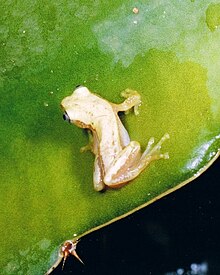Lesser banana frog
| Lesser banana frog | |
|---|---|

| |
| Scientific classification | |
| Domain: | Eukaryota |
| Kingdom: | Animalia |
| Phylum: | Chordata |
| Class: | Amphibia |
| Order: | Anura |
| Family: | Hyperoliidae |
| Genus: | Afrixalus |
| Species: | A. brachycnemis
|
| Binomial name | |
| Afrixalus brachycnemis (Boulenger, 1896)
| |
| Synonyms | |
| |
The lesser banana frog (Afrixalus brachycnemis) is a species of frog in the family Hyperoliidae.[2]
It is found in Malawi, Mozambique, and Tanzania. Its natural habitats are moist savanna and shrubland, seasonally wet or flooded lowland grassland, swamps, intermittent freshwater marshes, and agricultural land. The species may be slightly impacted by agricultural encroachment and insecticide use.[1]
Description
[edit]African lesser banana frogs have transparent skin that can be seen through to reveal their bones.[3]
Habitat
[edit]The lesser banana frog's natural habitats are marshes in moist grasslands and savannas at elevations up to 1,400 m and down to 400 m. They can survive in anthropogenic habitats. Breeding takes place in ephemeral ponds with dense peripheral vegetation.[4]
References
[edit]- ^ a b IUCN SSC Amphibian Specialist Group (2019). "Afrixalus brachycnemis". IUCN Red List of Threatened Species. 2019: e.T56056A3034023. doi:10.2305/IUCN.UK.2019-3.RLTS.T56056A3034023.en. Retrieved 17 November 2021.
- ^ Frost, Darrel R. (2013). "Afrixalus stuhlmanni (Pfeffer, 1893)". Amphibian Species of the World 5.6, an Online Reference. American Museum of Natural History. Retrieved 26 November 2013.
- ^ "Lesser Banana Frog (Afrixalus brachycnemis) - Pictures and facts - Amphibians @ thewebsiteofeverything.com". thewebsiteofeverything.com. Retrieved 2023-03-20.
- ^ "Afrixalus brachycnemis". IUCN Red List. 1 August 2013. Retrieved 20 March 2013.

